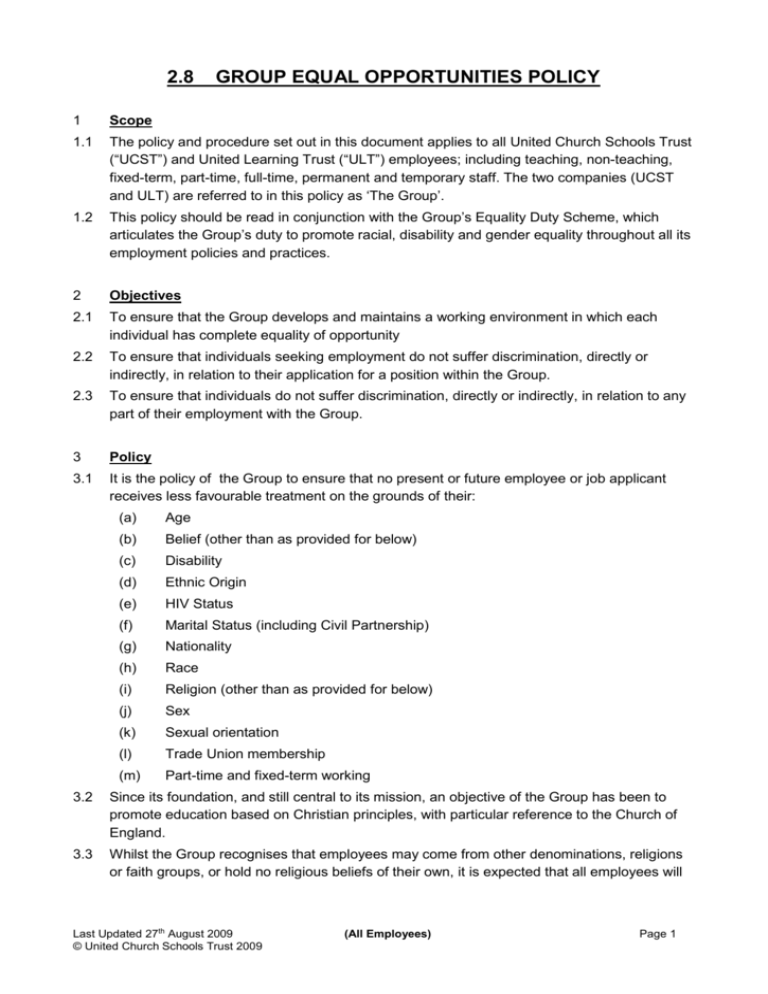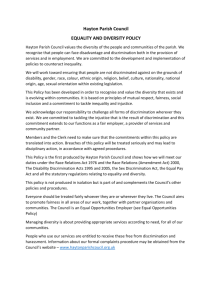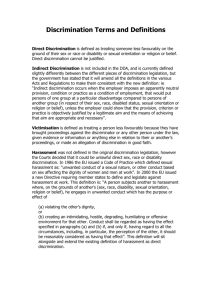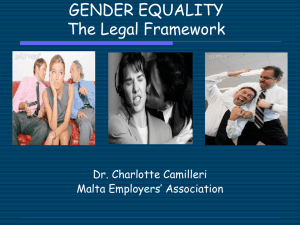Equal Opportunities Policy - National Union of Teachers
advertisement

2.8 GROUP EQUAL OPPORTUNITIES POLICY 1 Scope 1.1 The policy and procedure set out in this document applies to all United Church Schools Trust (“UCST”) and United Learning Trust (“ULT”) employees; including teaching, non-teaching, fixed-term, part-time, full-time, permanent and temporary staff. The two companies (UCST and ULT) are referred to in this policy as ‘The Group’. 1.2 This policy should be read in conjunction with the Group’s Equality Duty Scheme, which articulates the Group’s duty to promote racial, disability and gender equality throughout all its employment policies and practices. 2 Objectives 2.1 To ensure that the Group develops and maintains a working environment in which each individual has complete equality of opportunity 2.2 To ensure that individuals seeking employment do not suffer discrimination, directly or indirectly, in relation to their application for a position within the Group. 2.3 To ensure that individuals do not suffer discrimination, directly or indirectly, in relation to any part of their employment with the Group. 3 Policy 3.1 It is the policy of the Group to ensure that no present or future employee or job applicant receives less favourable treatment on the grounds of their: (a) Age (b) Belief (other than as provided for below) (c) Disability (d) Ethnic Origin (e) HIV Status (f) Marital Status (including Civil Partnership) (g) Nationality (h) Race (i) Religion (other than as provided for below) (j) Sex (k) Sexual orientation (l) Trade Union membership (m) Part-time and fixed-term working 3.2 Since its foundation, and still central to its mission, an objective of the Group has been to promote education based on Christian principles, with particular reference to the Church of England. 3.3 Whilst the Group recognises that employees may come from other denominations, religions or faith groups, or hold no religious beliefs of their own, it is expected that all employees will Last Updated 27th August 2009 © United Church Schools Trust 2009 (All Employees) Page 1 conduct themselves appropriately in the light of the Group’s objectives and ethos (which has been formalised into a statement), particularly when in school, when dealing with students, or when on school business in the eyes of the public. 3.4 The Policy works to ensure that no present or future employee or job applicant is disadvantaged by any conditions or requirements which cannot be shown to be justified. 3.5 The Policy will be implemented in accordance with the statutory requirements as laid down in relevant legislation. 4 Definitions Of Discrimination 4.1 Direct Discrimination. This takes place when a person or group of people are treated less favourably than other people in the same or similar circumstances. For example, refusing to employ people who meet the requirements of a job because of their colour, their sexual orientation, because they may be disabled or have children, would all constitute direct discrimination. 4.2 Indirect Discrimination. This takes place when a requirement or condition has the effect of discriminating unfairly and unjustifiably between one group or one individual and another. This can happen quite unintentionally, for example, standard entry qualifications applied automatically across a wide range of jobs, may lead to a position where applicants are asked to meet requirements which are not relevant to the needs of the job. 4.3 Institutional Discrimination. This takes place when established policies, practices and procedures within an organisation have discriminatory effects whether intentional or not. 5 Responsibilities 5.1 The Group has the primary legal and moral responsibility for ensuring that discrimination does not occur and is met by an effective policy which is continually monitored. 5.2 At each Academy, responsibility for the application of this policy lies with the Principal. 5.3 The Group is liable (together with its employees) for any acts of unlawful discrimination by its staff even when such acts are carried out without the Group's knowledge or approval. 5.4 The Group will act to protect its employees from instances of bullying and harassment. For further details please see the Group Harassment and Bullying Policy. 6 Employment 6.1 The Policy aims to ensure: (a) The recruitment of the most suitable person for the job; (b) That no job applicant or employee receives less favourable treatment than another on any grounds of age, creed (other than as provided for in paragraph 3), disability, ethnic origin, HIV status, marital status (including civil partnership), nationality, race, religion (other than as provided for in paragraph 3), sex, sexual orientation, social status, part-time employment status or trade union membership or is disadvantaged by any condition or requirement which cannot be shown to be justified. Last Updated 27th August 2009 © United Church Schools Trust 2009 (All Employees) Page 2 6.2 The Policy will be maintained by ensuring that the Group's Recruitment and Selection Policy and Procedures are adhered to at all times. The main points are as follows. 7 Recruitment 7.1 All job descriptions will be reviewed by the Principal and the local Human Resources administrator prior to advertisements being placed, to ensure they are relevant, nondiscriminatory and accurately reflect the requirements of the post. Any special or unusual demands that are a requirement of the post holder will be clearly stated. It is recommended that action is undertaken to assess the diversity of the staff and take positive action to address any under representation shown, for example disabled, ethnic minorities and gender. 7.2 Where any doubt exists, advice must be sought from the Group HR Department. 7.3 A person specification will be drawn up for each job prior to advertisement. This must reflect the requirements contained in the job description and should clearly indicate the essential and desirable aspects of a successful candidate in terms of: (a) Qualifications; (b) Knowledge and Skills; (c) Experience; (d) Competencies i.e. being able to work on own initiative. 7.4 Advertisements must be clear and unambiguous and must not discriminate either directly or indirectly. 8 Selection Process 8.1 All candidates will be considered solely on their ability to do the job at all stages, including short listing, testing and interviewing. Selection decisions must not be influenced by the applicant's age, creed (other than as provided for in paragraph 3), disability, ethnic origin, HIV status, marital status (including civil partnership), nationality, race, religion (other than as provided for in paragraph 3), sex, sexual orientation, social status or trade union membership. 8.2 Selection decisions must not be influenced by the prejudices of other staff. 8.3 Interview processes must be impartial and related solely to characteristics determined at 7.1 and 7.3 above. (a) All interviews will be carried out by more than one member of appropriately trained staff and (wherever possible with a mix of gender). They will be carried out as objectively as possible using a set of 'core questions' which cover the main aspects of the job, although it is accepted that every interview will differ to some extent. (b) Information necessary for personal records will be collected only after a job offer has been made and accepted. (c) Interview questions must be related only to the requirements and circumstances of the job and must not be of a discriminatory nature. Last Updated 27th August 2009 © United Church Schools Trust 2009 (All Employees) Page 3 8.4 Impartial psychometric and ability tests can be sought, but must only be used where they are appropriate to the characteristics determined at 7.1 and 7.3 above, and would not disadvantage an applicant with a disability. 8.5 All applicants invited for interview will have the right, on request, to be informed in writing of the reasons for their non selection. 8.6 A note of reasons for selection and non selection must be made at the time of interview and will be kept on the job file. 9 Monitoring 9.1 All job applicants will be requested to complete an Equal Opportunities Monitoring Form on their application for a post within the Group. 9.2 The information given will remain confidential and will be used solely for monitoring purposes and will form no part of the selection process. 9.3 A summary of the information provided by the monitoring forms will be held by the local HR administrator and sent at the end of the process to the Group HR Department for use in reviewing the Recruitment & Selection Policy and Procedures. 10 Training & Development 10.1 The Group is committed to providing training around issues of equality. All new members of staff will receive details of the Equal Opportunities Policy and will receive training as soon as possible after commencing employment with the Group, as part of their induction programme. 10.2 The Group is committed to making training opportunities accessible to all its employees and will undertake regular monitoring of those who do and do not attend training events. 11 Equal Pay 11.1 The Group is committed to achieving the principle of equal pay and recognises that in order to achieve this it should operate a pay and reward system which is transparent, objective and free from bias. 11.2 To achieve this aim the Group will: 12 (a) Examine and keep under review the existing pay and reward practices; (b) Undertake regular impact monitoring of pay practices; (c) Provide training and guidance to managers with responsibility for pay decisions; (d) Continue to work in partnership with the Group’s recognised Trade Unions to implement this policy. Disciplinary Procedure 12.1 Any breaches of this policy will be considered under the Disciplinary Procedure. 12.2 In applying the Disciplinary Procedure, care must be taken to ensure that members of one particular group are not disciplined for behaviour which would be overlooked or condoned in other groups. Last Updated 27th August 2009 © United Church Schools Trust 2009 (All Employees) Page 4 13 Capability Procedure In applying the Capability Procedure, care must be taken to ensure that members of one particular group are not subject to capability procedures for performance which would be overlooked or condoned in other groups. However, it is recognised that there may be occasions where a ‘disabled person’ may need to be treated differently in order for the Group to comply with its requirement to make reasonable adjustments under the terms of the Disability Discrimination Act. 14 Grievance and Disputes Procedure 14.1 Particular care must be taken to deal effectively with all complaints of discrimination, harassment or victimisation. All complaints must be processed through the Group's Harassment and Bullying Procedure. 14.2 Any employee who has, in good faith, complained and/or taken action under relevant employment legislation, including the Race Regulations Act 1976, Sex Discrimination Act 1975 (amended 1986), Disability Discrimination Act, Employment Equality (Sexual Orientation) Regulations, Employment Equality (Age) Regulations 2006, etc. and/or other aspects of this policy shall not receive less favourable treatment than any other employee. 15 Job Security, Redeployment and Redundancy Procedure 15.1 Principals shall not discriminate against particular staff groups in selection for redeployment or voluntary redundancy. 15.2 Selection criteria shall be examined to ensure that they are not discriminatory. 15.3 All redundancies, including voluntary redundancies, shall be carried out in a fair and consistent manner. 16 Review 16.1 This Policy will be reviewed annually by its Joint Negotiation Committees. Legislative changes may prompt further reviews. Last Updated 27th August 2009 © United Church Schools Trust 2009 (All Employees) Page 5







